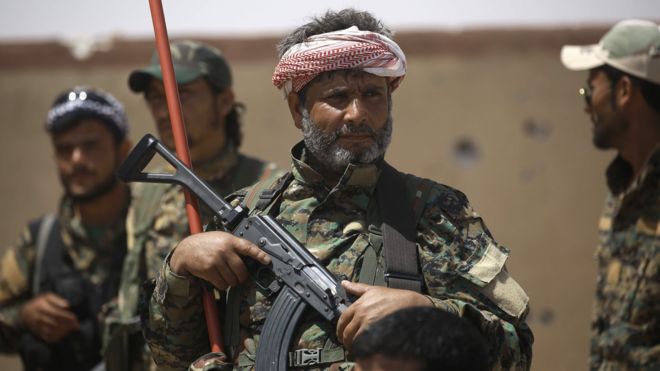
Kurdish-led fighters overran the last village held by the Islamic State group in Syria on Wednesday, confining its once vast cross-border “caliphate” to two small hamlets, a war monitor said according to ekurd.net.
It is the culmination of a broad offensive launched by the Syrian Democratic Forces SDF last September with US-led coalition support in which they have reduced the jihadists’ last enclave on the north bank of the Euphrates valley near the Iraqi border to a tiny rump.
The capture of the village of Baghouz leaves the few remaining diehard IS fighters holed up in scattered homesteads among the irrigated fields and orchards on the north bank of the Euphrates Valley.
“Search operations are continuing in Baghouz to find any IS fighters who are still hiding,” the head of the Britain-based Syrian Observatory for Human Rights, Rami Abdel Rahman told AFP.
“The SDF will now have to push on into the farmland around Baghouz.”
“Around 4,900 people, mostly women and children but including 470 IS fighters, have fled the jihadists’ fast dwindling enclave since Monday, Abdel Rahman said late on Tuesday.
Of those 3,500 surrendered to the advancing SDF on Tuesday alone.
They were evacuated on dozens of trucks chartered by the SDF.
The fall of Baghouz follows the SDF’s capture of the enclave’s sole town of Hajin and the villages of Al-Shaafa and Sousa in recent weeks.
The new wave of departures means that nearly 27,000 people have left former IS areas since early December, including almost 1,800 jihadists who have surrendered, the Observatory said.
The whereabouts of the ultra-elusive IS supremo Abu Bakr al-Baghdadi, who has made just once public appearance — in Iraq’s then IS-held second city Mosul in 2014 — are unknown.
It is a far cry from the jihadists’ peak in 2014, when they overran large parts of Syria and neighbouring Iraq and Baghdadi proclaimed a “caliphate” in areas under their control.
The gains have come at the cost of heavy losses for the mainly Kurdish fighters of the SDF and despite their sense of betrayal by their US ally after President Donald Trump made the surprise announcement last month that Washington would withdraw all its troops.
Washington has for years supported the Kurdish-led Syrian Democratic Forces (SDF) in the fight against the Islamic State group in Syria, as part of an international anti-jihadist coalition dominated by the Kurdish People’s Protection Units (YPG). But U.S. President Donald Trump abruptly announced the pullout from Syria.
The Syrian Kurdish Democratic Union Party PYD and its powerful military wing YPG/YPJ, considered the most effective fighting force against IS in Syria and U.S. has provided them with arms. The YPG, which is the backbone of the SDF forces, has seized swathes of Syria from Islamic State.
Neighbouring Turkey has threatened repeatedly to launch a cross-border operation to crush the Kurdish fighters of the SDF and the autonomous region they have set up in Syrian Kurdistan (Rojava) in areas of northern and northeastern Syria under their control.
Turkish troops had been held at bay by the intervention of US troops who set up observation posts along the border and mounted joint patrols with Kurdish fighters.
But with those troops gone, the Kurds fear they will be exposed to the full might of the Turkish military.
In 2013, the PYD — the political branch of the Kurdish People’s Protection Units (YPG) — has established three autonomous Cantons of Jazeera, Kobani and Afrin and a Kurdish government across Syrian Kurdistan in 2013.
Turkey fears the creation of a Kurdish autonomous region or Kurdish state in Syrian Kurdistan could encourage separatism amongst its own Kurds, according to analysts.
Ankara has previously launched two operations in Syrian Kurdistan.
On August 24, 2016 Turkish troops entered the Syrian territory in a sudden incursion which resulted in the occupation of Jarablus after IS jihadists left the city without resistance. Most of Turkish operations were focused only against the Kurdish forces.
In 2016, the Turkish troops entered northern Syria in an area some 100 km east of Afrin to stop the Kurdish YPG forces from extending areas under their control and connecting Syrian Kurdistan’s Kobani and Hasaka in the east with Afrin canton in the west.
In January 2018, Turkish military forces backed pro-Ankara Syrian mercenary fighters to clear the YPG from its northwestern enclave of Afrin. In March 2018, the operation was completed with the capture of the Kurdish city of Afrin.
The flags of Turkey and Syrian rebel groups were raised in the Kurdish Afrin city and a statue of Kurdish hero Kawa, a symbol of resistance against oppressors, was torn down.
Residents of the Kurdish city and Human right groups accuse Turkey and pro-Ankara fighters of kidnappings for ransom, armed robberies and torture.


